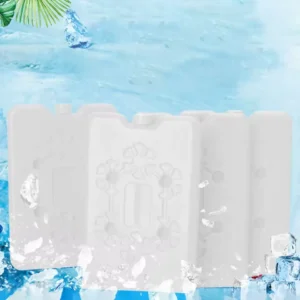Introduction
When packing a cooler for a trip, picnic, or outdoor adventure, one crucial decision is whether to use traditional ice cubes or reusable ice packs. Both options have their benefits and drawbacks, but which one is the better choice? In this article, we’ll dive deep into the efficiency, longevity, cost-effectiveness, and convenience of ice packs versus ice cubes to help you make an informed decision1. Understanding Ice Packs and Traditional Ice
 What Are Ice Packs?
What Are Ice Packs?
Ice packs are gel-filled or water-based packs that freeze solid when placed in a freezer. They come in various shapes and sizes, making them a reusable and mess-free cooling option.
What Is Traditional Ice?
Regular ice, often in the form of cubes, crushed ice, or large blocks, is simply frozen water. It’s readily available, inexpensive, and commonly used in coolers and beverages
2. Cooling Efficiency: Which One Lasts Longer?
Ice Packs
Ice packs are designed to stay frozen longer than regular ice, thanks to the chemicals or gel inside that have a lower freezing point. This means they can keep your cooler colder for extended periods without melting quickly.
Traditional Ice
Regular ice melts faster than ice packs, especially when exposed to warm temperatures. However, large ice blocks tend to last longer than crushed or cubed ice.
3. Do Ice Packs Keep Food Colder Than Ice?
4. Which Option Is More Convenient?
 Ice Packs
Ice Packs
- Reusable: You can refreeze them and use them multiple times.
- No Mess: Unlike ice cubes, they don’t create a pool of water as they melt.
- Consistent Temperature: They help maintain an even cooling effect.
Ice Cubes
- Easily Accessible: Available at any store or can be made at home.
- Better for Drinks: Can be used directly in beverages.
- Molds to Cooler Space: Ice can fill gaps between items for maximum coverage
5. Cost-Effectiveness: Ice Packs vs. Ice
Are Ice Packs Cheaper?
While ice packs have an initial cost, they are reusable, making them a cost-effective option in the long run.
Are Ice Cubes More Affordable?
Regular ice is cheaper upfront, but over time, continuously buying ice bags can add up, making ice packs the better investment..
6. Environmental Impact
7. Which Is Better for Outdoor Activities?
8. Health and Safety Considerations
- Ice Packs: Safe for food storage but should not be ingested.
- Traditional Ice: Safe for consumption but can harbor bacteria if not properly stored.
9. Best Practices for Keeping Your Cooler Cold
Use a combination of ice packs and ice cubes for optimal cooling
Pre-chill your cooler and food before packing.
Keep your cooler closed as much as possible to retain cold air.
Layer ice packs at the bottom and use ice cubes to fill gaps.Conclusion: Ice Packs or Ice – Which Should You Choose?